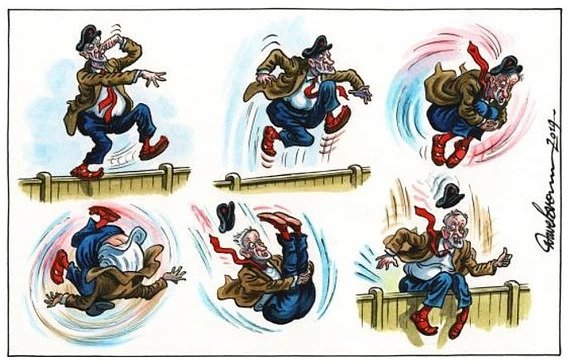
One of the unsung heroes of British politics is Dave Brown. Never heard of him? It’s amazing how some of the most gifted and talented artists don’t get the recognition they deserve.
Dave Brown is the principal cartoonist of The Independent, which still exists as a newspaper even though it doesn’t have anything to do with paper any more, instead appearing as a daily online news service. His cartoon this week (right) is a brilliant depiction of Jeremy Corbyn jumping off the fence, somersaulting like an Olympic gymnast and ending up sitting on the fence again. Satire at its best.
Except that behind the brilliant satire is a division of British politics that I don’t think has been fully understood. Much thought has been devoted how the old left/right economic distinctions have given way to Remain/Leave divisions based on whether the UK should remain a member of the European Union or leave. But actually there’s a three-way split in British politics that skews the picture.
The presumption has been that the Conservatives, Brexit Party and the remnants of Ukip cover Leave, while the Liberal Democrats, Greens, Welsh and Scottish nationalists cover Remain. Labour’s role in this has been slightly fudged, given that the leadership is keen to keep in with the Leave side, but the party’s membership is about 80% pro-Remain. But to depict Labour like that is an oversimplification.
The Labour party conference is taking place in Brighton, a mere bus ride from my home. Today I went to a fringe meeting on ‘coalitions of the left’, open to people of all parties but 95% packed with Labour party members. As well as the highly impressive MPs Clive Lewis and Caroline Lucas, there were plenty of participants who supported the idea of Labour encouraging tactical voting in areas where the Liberal Democrats or Greens stand a better chance of beating a Conservative, but almost as many who didn’t take that view.
Despite Jeremy Corbyn being Labour’s leader, it is easy to underestimate how many people in Labour still hanker after a socialist victory over capitalism, and who see the world in terms of the working class versus their capitalist enemies. One speaker, the trade unionist Jeanine Booth, made a very coherent pitch for this, saying that for Labour to go into either a pre-election arrangement or a post-election pact with the Greens or Liberal Democrats would be defeatist as it would by definition mean diluting the socialist agenda.
Leaving aside the merits and demerits of this argument, it clearly carries an inherent recognition that, if the pursuit of pure socialism means another couple of election defeats before a majority can be assembled, that’s a price worth paying. Booth and her supporters were sufficiently confident that they could build a majority for pure socialism that they didn’t really acknowledge a possible defeat. They certainly didn’t see the need to pursue cooperation with other centre-left parties, a view that various people desperate to rid Britain of the current Conservative government might not share.
Split in the Remain half
The point is that opponents of Brexit don’t group comfortably into one mass. If Britain is split roughly 50:50 into Remain/Leave halves, the pro-Remain side is split into those who just want the UK to remain in the EU and those who would like the UK to remain in the EU but who view the pursuit of pure socialism as a higher priority, even if it means accepting Brexit (and possibly a dilution of democracy if the worst fears about Boris Johnson’s government prove to be true).
But you can’t have three halves, and the split is largely in the Remain half. This is why a Conservative party currently polling at around 30% is still set for an overall majority at the next general election, widely expected to be later this year or early next. That majority will come from the Remain vote being split between Lib Dems, Greens, social democrat Labour and socialist Labour. In fact such was the impassioned way the socialist speakers at this Brighton meeting spoke about fighting ‘the enemies of the working class’ that they may have more in common with those on the Leave side, as identification with a tribe seems more important to them than seeking to understand a rival viewpoint.
This is the argument in favour of cross-party cooperation. Labour is likely to be the biggest party on the left of British politics after the general election, but it will only stop Johnson getting a majority if it can put its resources into seats it can win, and leave the seats it can’t win to other parties to challenge the Conservatives. And for that to happen, both socialist and social democratic Labour will need to be smart about their campaign.
It almost makes one understand why Jeremy Corbyn would work to perfect a tuck pike round-off double flick that lands him slap bang back on the fence.
